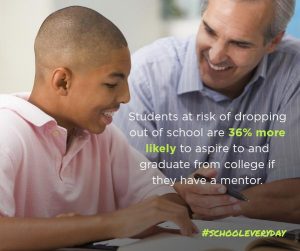David Shapiro, CEO of MENTOR: The National Mentoring Partnership, wrote this commentary piece, which originally appeared on the Grad Nation blog.
Increasingly, mentoring is being utilized as a powerful tool to bridge the opportunity gap and support young people in staying connected or getting re-connected to school, work and community. While delivering academic content and building skills will always be a focus of education, we must also address the challenges in young people’s lives that will challenge their ability to engage in school.
Recently, I listened to a mentee who had experienced the kind of trauma throughout her upbringing that made it impossible to imagine her being able to focus on school or on anything beyond getting through the day in one piece. Today, she stands on the doorstep to college with a full scholarship, and credits her relationship with her mentor with giving her the ability to trust and love. She poignantly said that without these core inner competencies, she would never have been able to receive any lessons from her teachers on engage in any learning with her peers.
When thinking of our own academic journey, many of us think back to our formative years. Years spent in the classroom having conversations that taught us more about the world and learning what sparked our imagination. Now, picture growing up and missing these critical opportunities because of missed school days.
Studies show as many as one out of 10 students is chronically absent, meaning they miss 10 percent or more of school days, or nearly a month.
Chronic absenteeism is a leading, early warning indicator of academic trouble and later dropout. We know that by connecting mentors with young people, we can implement an effective and necessary strategy in tackling and lowering these compelling statistics. Mentors stress school’s importance, can recognize barriers to attendance and help address them with parents or guardians and school personnel. Mentors, if meeting with students in the school setting, give students something special to look forward to, individualized and consistent attention, and offer schools a power partner and point of connection.
In The Mentoring Effect report, our research shows that young people who were at-risk of dropping out (with absenteeism as one of the risk factors) who had a mentor growing up experienced many positive outcomes related to academics compared to their peers who could not identify a mentor growing up. They were:
- 55 percent more likely to be enrolled in college.
- 81 percent more likely to report participating regularly in sports or extracurricular activities.
- More than twice as likely to say they held a leadership position in a club or sports team.
- 78 percent more likely to volunteer regularly in their communities.
And additional research has shown that students who meet regularly with their mentors are 52% less likely to skip a day of school and 37% less likely to skip a class.
All of those things increase the likelihood that a student will be engaged in school and persist in the face of adversity. All of which will impact attendance and truancy. But a gap persists. The Mentoring Effect report shows that one in three youth will reach age 19 without a mentoring relationship of any kind.
Knowing mentoring can change lives by helping to ensure more youth are connected to opportunity, how can mentors and caring adults change the equation and help encourage students to attend school every day?
- Mentors can offer direct academic support that helps youth build “small wins” in the classroom
- Mentors build feelings of self-efficacy around coursework
- Mentors help establish a growth mindset and identify “sparks”
- Mentors build connectedness to teachers and peers (support seeking)
- Mentors help connect school and future career or educational goals
Throughout the month of September, MENTOR: The National Mentoring Partnership and our network of affiliate Mentoring Partnerships are reinforcing the importance of school every day as part of the Attendance Awareness Month public awareness campaign. For the third year in a row, we will use this national spotlight to illuminate the power of these positive connections. The week of September 14-20 is designated as Mentoring Effect & Attendance Week.
We need community partners, schools, teachers, parents, mentors and friends to make a pledge to collectively combat chronic absence. We all need to make a pact to follow these five simple steps, with the goal of more youth learning, growing and achieving.
- Check in with your mentee about school attendance on a regular basis.
- Have conversations that help connect school with their future dreams and goals.
- Connect school, home, and mentors/mentoring programs to support young people in attending school regularly.
- Troubleshoot any barriers to getting to school.
- Celebrate regular attendance!
Will you make a pact today for the nation’s young people? We need you to amplify our message that mentors help guide a young person’s journey to productive adulthood and ensure youth have the additional support they need to succeed academically and otherwise. Take that extra step today to show the student in your life that you care, you’re there and that they matter. We must advocate for increased school-community partnerships that deliver high quality mentoring for our students who need it the most so they can be present, strive, and thrive.
David Shapiro is CEO of MENTOR: The National Mentoring Partnership, the unifying champion for quality youth mentoring in the United States. MENTOR’s mission is to close the “mentoring gap” and ensure our nation’s young people have the support they need through quality mentoring relationships to succeed at home, school, and ultimately, work.